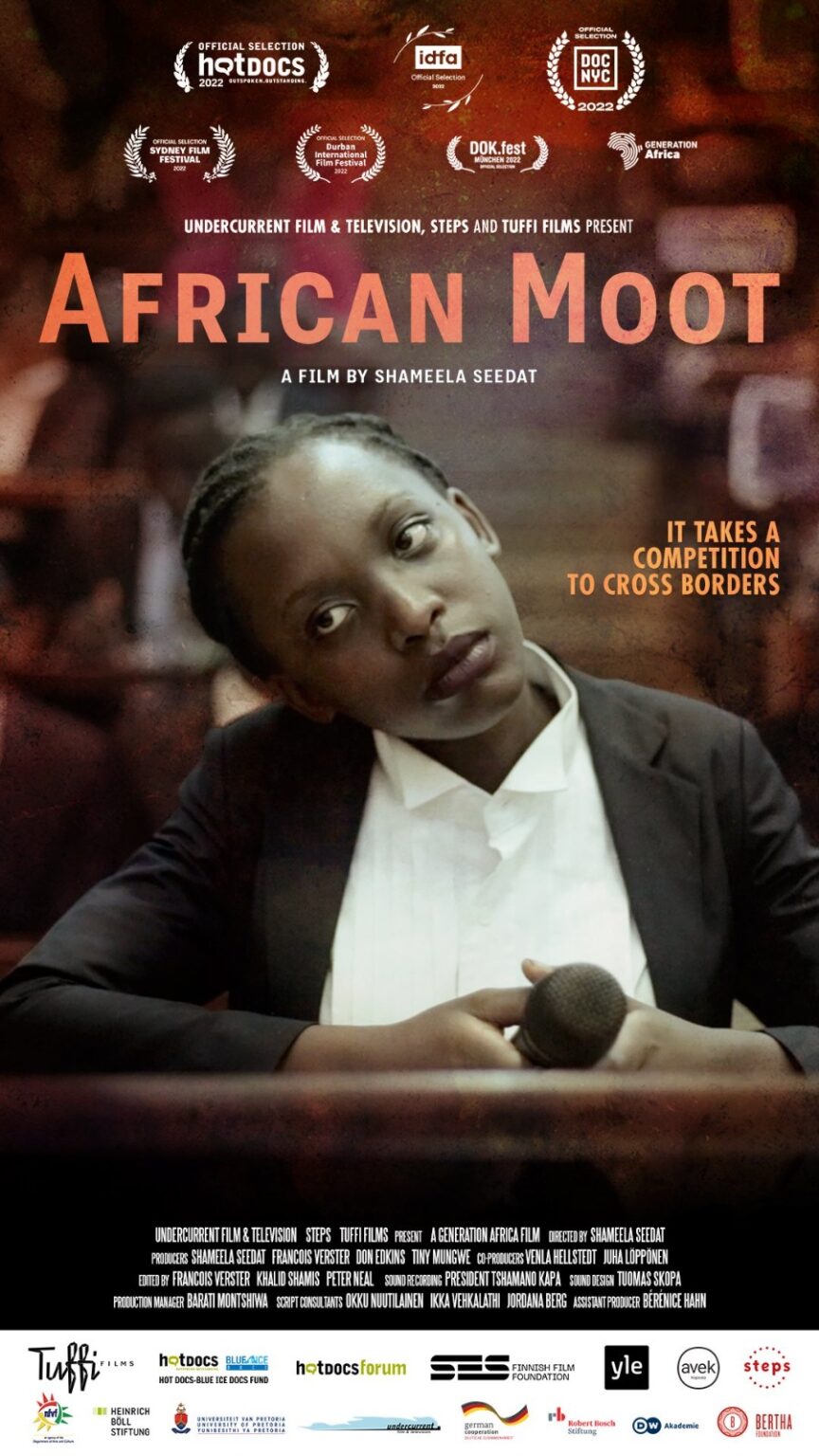By Buhle Andisiwe Made
Film director Shameela Seedat’s film, African Moot, follows the journey of four pairs of law students from four different African universities in Egypt, Kenya, South Africa and Uganda. This eye-opening documentary showcases human rights and refugee issues in Africa.
The following paragraphs will re-examine the film and highlight the screening hosted on 4 May by the Documentary Filmmakers’ Association (DFA) and docLOVE at the Amazwi South African Museum of Literature.
African Moot documentary is a derivative of the Christof Heyns African Human Rights Moot Court Competition – a large gathering for African law students wherein they argue hypothetical cases around various human rights matters in the continent. Arguing the sides of both prosecutor and defence in litigation, the students for the year of 2019 focused on the rights of refugees in Africa representing their respective institutions in Gaborone, Botswana.
Through rigorous preparation and extensive readings, the students in the documentary delve deep into hard-hitting issues surrounding refugees in the continent. Notions of religion and sexuality arise as students tackle their hypothetical cases. Pairs of students from the American University in Cairo in Egypt; the University of Nairobi in Kenya; the University of Cape Town in South Africa, and Makerere University in Uganda battle for the championship.
During the documentary, one moot competitor said, “African students coming together to discuss these issues because as much as we come from different countries, the African contexts are quite similar. Putting our minds against the best minds in Africa would be interesting.”
Makerere University student highlights that everyone should understand that we are potential refugees. “You don’t know what’s going to happen to your security tomorrow; you don’t know what’s going to happen to your home country. Nor what you’re going to need the next day,” they highlighted.
This kind of statement draws viewers into a more emotional understanding of any refugee or refugee system. Personally, valuing humanity and viewing each person as equal to you is essential. People often outcast others due to differences such as social background, patriotism, religion, and sexuality. The idea of defending a foreigner seems so farfetched, especially in Africa. However, when a fellow person is in danger, assisting is only fitting because, as Makerere’s representatives mentioned, one doesn’t know what will happen to their home country.
To better understand the position of a refugee, the Oxford Languages Dictionary Online provides the following definition: “A person who has been forced to leave their country to escape war, persecution, or natural disaster.” It is undesirable or, rather, unplanned displacement.
Refugees do not derive pleasure in being displaced, yet when seeking sanctuary in a foreign land, the burden becomes unbearable due to discrimination and camp-like accommodation. Egypt’s American University in Cairo representative highlighted that there are a lot of restrictions on the refugee movement. Though this may be, the future lawyers of different African countries are eager to challenge the status quo and become the difference, as they oathed to make the change they want to see.
Seedat portrays the youth of Africa as people who are focused and driven in dealing with such ideas in their continent. Though the African Moot Court is a gruelling competition, their approach to human rights matters seems optimistic. Aljazeera, an Arabic-language international news network of Qatar, states that the students “Learn what it means to fight for their cause, country and continent.”
The engagement depicted in the film of fellow African students is lovely to watch, with the
different cultures, backgrounds and groups coming together. The ability to discuss different ideals and immerse themselves into topics so much that they are relentless in doing so is picture-perfect to watch. The inspiring factor of young leaders in the African continent being submerged into such a conversation can lead viewers to think there is hope for a better, more inclusive, and supported Africa with such legal minds at work.
Friendship and emotions are tested throughout the film, as we witness the University of Nairobi students break apart after a mistake happens in awarding them. The competition’s fierce nature leaves some reluctant to participate and others overwhelmed. The University of Cape Town students bow out of a workshop due to skewering notions of the judge’s argument about queer rights.
Advocate and Rhodes University lecturer Shuaib Rahim were among the panellists who joined the conversation about human rights after the screening. The discussion was to elaborate on the importance of such a film and the collaboration of journalists and law representatives in highlighting such conversations around our continent.
Advocate Shuaib Rahim spoke to the lecturers and students, along with SivuBuhle Media, innovators specialising in documentary film production, digital reporting, multimedia design and corporate photography, about the importance of journalism in such matters. Rahim wants to “share more of what is possible with the people here to shake the world with us.” Journalists tell stories, just like documentary filmmakers do. Rahim believes the power in numbers may be a great collaboration in reaching the masses when sharing real-life problems, especially human rights-related issues.
As someone who was a part of the human rights trust volunteer program, Rahim relates closely to
the stories shared in African Moot are similar to those he experienced.
In the words of one moot student in the documentary, “To be able to move is to be able to understand other people. If you understand, you understand that they’re not that different.”
This relatively robust line shows that we can learn when we migrate; we should also prioritise learning from those displaced.


